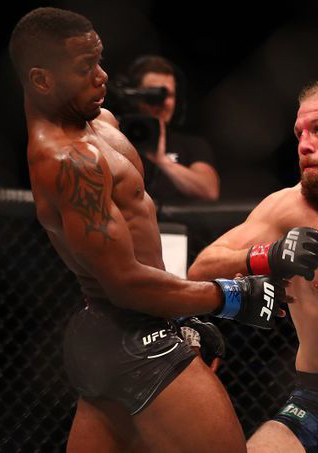There was a time when having a spot on the UFC roster was indicative of the idea that a fighter had made his or her way to the “top” of the mixed martial arts arena. That has changed over the years, as names such as Phil “CM Punk” Brooks and Kevin “Kimbo Slice” Ferguson have competed in the Octagon. And now, Octagon success no longer ensures a place within the UFC ranks, as the recent releases of Elias Theodorou and Justin Willis point toward a continued trend of the UFC flexing its muscle to dictate fighters’ destinies. These cuts provide yet another reason for the fighters to try to find a way to band together and take back some of the power that organizational leadership has over them.
Last week did not feature a UFC event, so the MMA news cycle was open enough to allow for reporting on Theodorou and Willis, who were both served their walking papers by the promotion. Theodorou was coming off a decision defeat to Derek Brunson at UFC on ESPN+ 9, a fight that was marred by multiple instances of the Canadian running from his opponent for separation, resulting in mounds of boos from the fans in attendance. Willis was also coming off a defeat, as he dropped a recent bout at UFC on ESPN+ 6 to Curtis Blaydes. However, according to a report by Aaron Bronsteter of TSN, Willis was offered a fight against Walt Harris, and he was removed from the organization shortly after declining the offer due to weight concerns.
Now the UFC has the power to cut men and women from the roster whenever it chooses. We’ve seen countless competitors relieved of their roster spots, usually after suffering a string of losses. But Willis and Theodorou were not in that situation. Combined they were 12-4 within the Octagon — with Willis possessing a strong record of 4-1, and the former TUF Nations winner Theodorou at 8-3. Both men were listed on the promotion’s Top 15 contendership rankings within their respective divisions. Then, their names suddenly dropped off those lists, as they are left looking for work in other places –- and this is in an MMA environment where financial opportunities are few and far between.
Theodorou fights with a style that isn’t likely to create many highlight-reel moments; he is a point-scorer with six of his eight UFC wins coming by decision. His most recent wins were strong examples of his propensity to strike for brief moments, then move away to reset in another portion of the cage. It would seem that his loss against Brunson was enough to push matchmakers over the edge, as it wasn’t a visually attractive fight in any respect.
The situation with Willis, however, is much more alarming. If it’s true that he was cut for declining a fight, particularly given the reasoning behind that decline, that should draw more concern. Weight cutting is a practice that has long term effects on an athlete’s body. In many ways, it hinders their ability to perform at peak levels. And yet, it would seem that the UFC made the decision to cut Willis because he raised a concern about making weight in July, and instead of working with him to find a viable timeframe to fight, the organization elected to cut him from the roster entirely. The UFC should have a keen interest in fighters being as healthy as possible before they step into the Octagon, but that doesn’t seem to be the case here.
These are two questionable situations that fighters have no ability to counteract. Their careers are totally beholden to the whims and preferences of the UFC brass. That’s why Theodorou and Willis can be cut, even though they’ve had consistent success in the Octagon, while individuals like Greg Hardy and Conor McGregor receive favorable treatment, regardless of their out-of-cage problems. Hardy’s dealings with the legal system are well known and well documented, and McGregor’s recent legal matters include charges for smashing a fan’s phone and the investigation into rape accusations. Neither of these bigger name fighters are facing the prospect of being cut due to their actions outside of the cage, but the UFC is willing to act against its lesser known fighters for much less severe matters.
So what does this mean for the fighters who remain on the roster? This is the question that everyone should be asking. Will the UFC take the same action if another fighter declines a fight due to weight concerns? What if another uses a fighting style that’s meant to win on the judges’ scorecards without giving fight fans the action they truly enjoy? There’s no telling how anything would go down and that’s the problem. We can say that Theodorou and Willis should not have been cut by the UFC, but there are very few boundaries as to what the UFC can decide to do with the men and women on its roster, particularly after they have lost a fight. And given that very few fighters go their entire career without losing, there’s very little that fighters can do collectively to push back against these kinds of decisions.
There seem to be no end to situations that illustrate fighters’ need to leverage their power against that of UFC leadership. Seeing Elias Theodorou and Justin Willis get cut days apart reinforces that need, but the Octagon competitors on the roster want no part of that fight, even if it could be much more important than any that take place in the cage.







